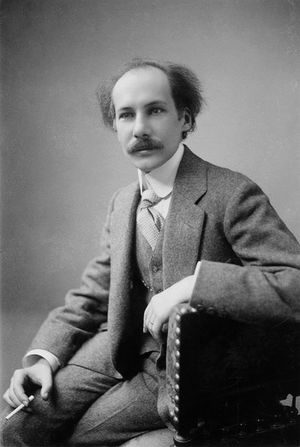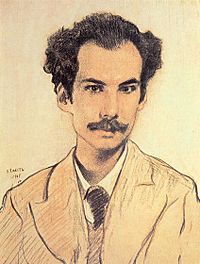Andrei Bely facts for kids
Quick facts for kids
Andrei Bely
|
|
|---|---|

Bely in 1912
|
|
| Born | Boris Nikolaevich Bugaev October 26, 1880 Moscow, Russian Empire |
| Died | January 8, 1934 (aged 53) Moscow, Russian SFSR, USSR |
| Occupation | Prose writer, poet, essayist, literary critic, dramatist |
| Alma mater | Imperial Moscow University (1903) |
| Period | 1900—1934 |
| Literary movement | Russian symbolism, modernism |
| Notable works | The Silver Dove (1910) Petersburg (1913/1922) |
| Signature | |
Boris Nikolaevich Bugaev (Russian: Бори́с Никола́евич Буга́ев), known by his pen name Andrei Bely (Russian: Андре́й Бе́лый; 26 October 1880 – 8 January 1934), was a famous Russian writer. He was a novelist, poet, and literary critic. Bely was a key figure in the Symbolist movement in Russia.
He was also a follower of Rudolf Steiner's Anthroposophy, a spiritual philosophy. His novel Petersburg is considered one of the greatest works of modernist literature. A major award in Russian literature, the Andrei Bely Prize, is named after him.
Contents
Life of Andrei Bely
Boris Bugaev was born in Moscow in 1880. He came from a very smart family. His father, Nikolai Bugaev, was a well-known mathematician. His mother, Aleksandra Dmitrievna, was a talented pianist. She taught young Boris about music.
Boris grew up in the Arbat area of Moscow. He was interested in many subjects, like math, biology, chemistry, music, and literature. He studied at the University of Moscow.
Early Influences and Friendships
Bely became part of the Symbolist movement. He also joined the Russian school of neo-Kantianism, a type of philosophy. He became friends with the poet Alexander Blok and his wife. Bely fell in love with Blok's wife, which caused some problems between the two poets.
Bely's father was a mathematician who liked analysis. But Boris was very interested in probability and entropy. He often wrote about these ideas in his books.
A philosopher named Vladimir Solovyov and his family greatly influenced Bely. Vladimir's younger brother, Mikhail, gave Boris his pen name, Andrei Bely. "Bely" means "white" in Russian.

Later Life and Philosophy
In his later years, Bely was deeply influenced by Rudolf Steiner's anthroposophy. He even became Steiner's friend. Bely tried to connect Steiner's ideas with the philosophy of Vladimir Solovyov. He believed in the "Eternal Feminine," which he saw as a "world soul" shared by everyone.
Bely traveled between Switzerland, Germany, and Russia during the Russian Revolution. He supported the Bolsheviks when they came to power. He then worked to help Soviet culture. He died in Moscow in 1934 at the age of 53. Many poems were written in Moscow in his memory.
Andrei Bely's Literary Works
Bely began his writing career with The Symphonies. These were experimental prose works written between 1900 and 1908. In 1909, he published his first novel, The Silver Dove. This book is known for its unique writing style and its feeling of coming doom. It was the first part of a series Bely planned called East or West.
His Masterpiece: Petersburg
Bely's novel Petersburg (published in 1913 and 1922) is seen as his greatest work. It is the second part of his unfinished series. The book uses a special way of writing where sounds often make you think of colors.
The story takes place in Petersburg during the Russian Revolution of 1905. The main character, Nikolai Apollonovich, gets involved in revolutionary plans. He is asked to assassinate a government official, who turns out to be his own father. At one point, Nikolai is chased by the sound of horse hooves from the famous statue of Peter the Great. Some experts think Petersburg includes ideas from Sigmund Freud's methods of understanding the mind.
Later Novels and Poems
After the Russian Revolution, Bely wrote two novels about his own life. These were influenced by Rudolf Steiner's anthroposophy. They are Kotik Letaev (1918) and The Christened Chinaman (1921). Critics have called Kotik Letaev Bely's most unique work. The Christened Chinaman is seen as his most realistic and funny.
He also wrote poems like Christ is Risen (1918), which praised the Revolution. Other poems include Glossolalia (1917) and The First Encounter (1921).
Bely's last novel was Moscow (1926—1932). This book tried to show what Russian intellectuals were like during World War I and the Russian Revolution. It has complex characters who change a lot. Bely also continued his experiments with language in this book.
Influence on Other Writers
Bely's essay Rhythm as Dialectic in The Bronze Horseman was mentioned by the famous writer Vladimir Nabokov in his novel The Gift. Nabokov praised Bely's detailed study of rhythm in poetry. Bely created a system to mark and calculate the stresses in poems. He found that diagrams of great poets' works often looked like shapes such as rectangles. Nabokov's own essay, "Notes on Prosody," largely followed Bely's ideas on Russian poetry.
See Also
 In Spanish: Andréi Bely para niños
In Spanish: Andréi Bely para niños
- Alexander Blok
- Aleksey Remizov
- Fyodor Sologub
- Russian Symbolism
- Russian literature

